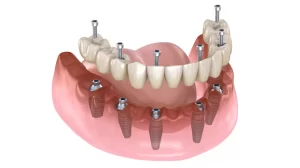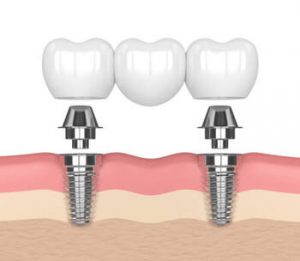When it comes to replacing missing teeth, the choice between dental implants and bridges is pivotal for anyone seeking to restore their dental health. Dental implants, involving a surgical or invasive procedure to insert a titanium post into the jaw bone, are celebrated for replicating natural tooth roots, thereby preventing bone loss and maintaining the integrity of the facial structure. In contrast, dental bridges, which require dental crowns to be fixed onto surrounding teeth, offer a solution for tooth replacement without oral surgery.
Addressing tooth loss with the proper replacement technique is paramount for sustaining oral health, keeping teeth aligned, and retaining the face’s natural contour. Dental implant procedures, though more invasive, offer an artificial tooth that closely mimics the appearance and function of natural teeth. Alternatively, the dental bridge procedure is less invasive but often involves modifying adjacent healthy teeth to support the replacement tooth.
In evaluating dental implants vs bridges, weighing the long-term implications for oral health is crucial. Dental implants are typically seen as a more long-lasting solution, requiring fewer dental visits and promoting better oral health by averting bone loss. While dental implants and bridges effectively replace lost teeth, dental implants offer greater durability and a more natural smile, thereby preserving the health of surrounding teeth without necessitating bone grafting. This article explores why dental implants, despite involving surgery, might be the preferred option for many seeking to restore their natural smile and maintain dental health. Explore in more detail.
Understanding Dental Implants
Dental implants are a state-of-the-art solution for replacing missing teeth. Unlike a temporary bridge, implants provide a more permanent bridge to the problem of lost or missing teeth. A dental implant is a titanium post surgically placed in the jaw bone as a substitute for tooth roots.
The dental implant procedure begins with an evaluation at a local dental clinic. If a patient is a suitable candidate, oral surgery for implant placement is scheduled. Post-surgery, a healing period allows for osseointegration, where the implant bonds with the jaw bone. After this, a dental crown is placed, offering a natural-looking appearance and restoring oral health.
 Several types of dental implants are designed to address specific needs. Some are for single-tooth replacements, while others can replace multiple teeth or even a full arch. This flexibility makes dental implants a versatile option compared to tooth implants vs bridges.
Several types of dental implants are designed to address specific needs. Some are for single-tooth replacements, while others can replace multiple teeth or even a full arch. This flexibility makes dental implants a versatile option compared to tooth implants vs bridges.
Regarding tooth replacement options, the dental implant vs bridge debate often centres on longevity and impact on surrounding teeth. Dental implants do not require altering adjacent teeth, unlike dental bridges. This preserves more of your natural teeth and maintains overall dental health.
Patients must consider the surgery involved in dental implants, as any surgical or invasive procedure has inherent risks. Situations with significant bone loss may require bone grafting to ensure the implant’s stability. Despite these considerations, the health benefits of dental implants are significant, including preserving facial structure and a natural smile.
Ultimately, whether it’s dental implants vs bridges or implants vs other teeth replacement methods, the decision should be made after a thorough discussion with a dentist. Properly installed and with proper care, dental implants can be a long-lasting solution to tooth loss, significantly enhancing a patient’s quality of life and confidence.
Understanding Dental Bridges
A dental bridge is a tooth replacement option designed to replace missing teeth. By bridging the gap where teeth are absent, dental bridges help retain the facial shape and prevent the shifting of surrounding teeth. They consist of replacement teeth anchored to neighbouring natural teeth or dental implants.
The Dental Bridge Procedure
Obtaining a dental bridge involves a series of steps at your dentist’s office. It starts with the preparation of adjacent teeth or the placement of dental implants. After tooth preparation, impressions are taken to fabricate the bridge. A temporary bridge may be provided to protect exposed teeth and gums while the permanent bridge is being made. The final step involves carefully placing the permanent bridge, ensuring alignment and comfort.
Varieties of Dental Bridges
Dental bridges come in different types. Traditional bridges involve creating dental crowns for the teeth adjacent to the missing tooth or teeth, supporting the artificial tooth in between. Cantilever bridges are similar but are used when teeth are on only one side of the gap. Maryland-bonded bridges use metal or porcelain frames bonded to the existing teeth. Implant-supported bridges, anchored on dental implants embedded in the jaw bone, are ideal for replacing multiple missing teeth.
Both versions effectively incorporate the requested keywords, providing a comprehensive overview of dental bridges, their types, and the procedure involved.
Comparing Dental Implants and Bridges
Understanding the differences between dental implants and bridges is crucial when replacing missing teeth. Dental implants involve a procedure where a titanium post is surgically placed into the jaw bone, mimicking the function of natural tooth roots. This process, which prevents jaw bone deterioration and maintains the natural alignment of teeth, is typically more involved and requires oral surgery.
 In contrast, the dental bridge procedure involves creating a bridge to fill the gap caused by missing teeth. This is done by fixing dental crowns to the adjacent teeth or implants, with an artificial tooth (or teeth) in between. Dental bridges are a common solution for replacing one or more teeth and are less invasive than dental implants. However, they may require the reshaping of adjacent healthy teeth to support the bridge.
In contrast, the dental bridge procedure involves creating a bridge to fill the gap caused by missing teeth. This is done by fixing dental crowns to the adjacent teeth or implants, with an artificial tooth (or teeth) in between. Dental bridges are a common solution for replacing one or more teeth and are less invasive than dental implants. However, they may require the reshaping of adjacent healthy teeth to support the bridge.
Material-wise, dental implants are made of a titanium post and a dental crown or artificial tooth designed to match the natural teeth. These materials are chosen for their durability and integration with the body. Dental bridges, on the other hand, are usually made of porcelain or ceramic, crafted to mimic the appearance of natural teeth.
In terms of longevity and durability, dental implants are often considered superior. With proper care, they can last a lifetime, preserving the health of the jaw bone and surrounding teeth. Dental implants do not require altering the existing teeth, which benefits overall dental health. Dental bridges, while effective, generally have a shorter lifespan and may need to be replaced every 5 to 15 years. They depend on the health of the surrounding teeth, which, if compromised by tooth decay or gum disease, can affect the bridge’s stability.
Overall, while dental implants require a more invasive procedure and often a higher initial investment, they offer significant long-term advantages regarding dental health, oral health, and maintaining a natural smile. Dental bridges, offering a quicker and less invasive option, are suitable for certain situations, particularly when multiple adjacent teeth need replacement. Ultimately, the decision between dental implants and bridges should be made after consulting with a dentist, considering individual needs, oral health status, and the desired outcome.
Advantages of Dental Implants Over Bridges
Regarding replacing missing teeth, the debate often centres around dental implants vs bridges. While both offer viable solutions, dental implants have distinct advantages.
Improved Oral Health and Bone Preservation
One of the most significant benefits of dental implants is their ability to preserve jaw bone and maintain oral health. Unlike dental bridges, which require the alteration of adjacent teeth, implants replace a lost or missing tooth without impacting surrounding teeth. The titanium post used in dental implants fuses with the jaw bone, mimicking the tooth root, which helps prevent bone loss and maintains the facial structure.
Long-term Effectiveness and Durability
Dental implants are renowned for their long-term durability. Unlike dental bridges that may need replacement after 10 to 15 years, implants can last a lifetime with proper care. This is partly due to the titanium used in implants, which is resistant to tooth decay and gum disease. Though more invasive than the dental bridge procedure, the surgical procedure involved in implant placement offers a permanent solution to tooth loss.
Better Aesthetic and Functional Outcomes
In terms of aesthetics, dental implants provide a more natural-looking appearance. They are designed to blend seamlessly with existing teeth, enhancing a natural smile. Functionally, they offer the strength and stability required for chewing, speaking, and other daily activities, closely mimicking natural teeth.
Comfort and Convenience in Daily Use
The comfort level with dental implants is significantly higher than with bridges. They do not require special care beyond regular dental hygiene practices. Unlike bridges, implants do not need dental crowns on adjacent teeth, which often makes them a more convenient and less invasive option.
Case Studies and Examples
Consider a case study where a patient with multiple missing teeth opted for dental implants. The implants restored not only the functionality of their teeth but also their confidence and oral health. In another example, a patient who replaced a single tooth with an implant experienced improved comfort and no dietary restrictions, unlike those with traditional bridges who might need to avoid certain foods.
In conclusion, while dental implants and bridges are effective tooth replacement options, implants offer several advantages in terms of oral health, longevity, aesthetics, comfort, and overall functionality. They are preferred by many experienced dentists and patients seeking to replace lost teeth and maintain a healthy, natural smile. Whether choosing an implant or a bridge, consulting with a local dental clinic and considering all tooth replacement options is essential for making an informed decision.
Considerations and Limitations
Deciding between dental implants and bridges involves understanding the contexts where one may be more beneficial. Dental bridges can be preferable in certain scenarios, especially considering the complexity and cost of dental implant surgery. For example, if a patient has lost multiple teeth and the adjacent teeth are healthy, a dental bridge can efficiently replace the missing teeth without requiring invasive surgery. Bridges are also often chosen for patients who may not be suitable candidates for oral surgery due to medical conditions or for those who prefer a less invasive approach.
Another factor to consider is the condition of a patient’s jawbone. Dental implants require a healthy and robust jaw bone for successful implantation. If a patient has experienced significant bone loss, a dental bridge might be a more feasible option since it does not require the same bone density as implants. This is particularly relevant for patients with long-term missing teeth, leading to atrophy of the jaw bone.
Cost is a major consideration when comparing dental implants vs bridges. Dental implants generally involve a higher initial investment, primarily due to the surgical procedure and the materials (like titanium posts and artificial teeth) used. Despite their potential long-term benefits in preserving dental health and facial structure, the upfront cost can be prohibitive for some patients.
Insurance coverage also varies greatly between these two tooth replacement options. Dental insurance plans more commonly cover dental bridges, or at least a significant portion of the cost is typically reimbursed. On the other hand, dental implants are often considered a cosmetic procedure and may not be covered extensively by insurance. Patients need to discuss with their dentist and insurance provider to understand the financial implications and coverage options for each procedure.
In conclusion, while dental implants offer significant advantages in oral health and functionality, dental bridges present a viable alternative in financial limitations, medical considerations, or when immediate, less invasive solutions are required.
FAQ: Understanding Dental Implants vs Bridge
Q1: What are the key differences between dental implants and bridges?
A1: Dental implants involve a surgical procedure to place a titanium post in the jaw bone, replacing the tooth root, and are topped with a dental crown. Bridges, on the other hand, use dental crowns on adjacent teeth to support a replacement tooth.
Q2: How do I choose between a tooth implant and a bridge?
A2: The choice depends on several factors, including the health of surrounding teeth, jaw bone density, financial considerations, and personal preference. Consulting with an experienced dentist at a local dental clinic is crucial.
Q3: Are dental implants more durable than bridges?
A3: Dental implants generally offer greater longevity and durability, preserving the jaw bone and maintaining alignment of natural teeth, compared to bridges.
Q4: Is dental implant surgery risky?
A4: Dental implant surgery carries risks like any surgical or invasive procedure, but these are minimal when performed by skilled dentists. Proper care and consultation are essential.
Q5: Can dental bridges replace multiple teeth?
A5: Dental bridges can replace one or more lost teeth and are often preferred when multiple adjacent teeth are missing.
Conclusion
 As we wrap up our discussion on dental implants vs. bridges, it’s evident that dental implants are the superior choice for most individuals seeking to replace missing teeth. Unlike dental bridges, which require the modification of adjacent teeth, dental implants offer a standalone solution that promotes better oral health. The dental implant procedure involves placing a titanium post in the jawbone, which supports an artificial tooth and helps maintain jaw bone integrity and prevent bone loss.
As we wrap up our discussion on dental implants vs. bridges, it’s evident that dental implants are the superior choice for most individuals seeking to replace missing teeth. Unlike dental bridges, which require the modification of adjacent teeth, dental implants offer a standalone solution that promotes better oral health. The dental implant procedure involves placing a titanium post in the jawbone, which supports an artificial tooth and helps maintain jaw bone integrity and prevent bone loss.
The advantages of choosing a tooth implant over a bridge are numerous. Not only do implants provide a more natural-looking appearance, but they also align closely with the function of natural teeth, allowing for easier eating and speaking. Additionally, implants contribute to the preservation of facial structure and prevent the shifting of other teeth.
Dental implants offer a durable and effective tooth replacement option for those who have lost one or more teeth, whether due to tooth decay, injury, or gum disease. They are designed to last decades with proper care, making them a more permanent and cost-effective solution than dental bridges.
If you’re considering dental implants as a solution for lost or missing teeth, we encourage you to contact Beyond Infinity Dental. Our skilled team is committed to providing comprehensive care and expert advice to help you regain a healthy, confident smile. To learn more about your tooth replacement options or to schedule a consultation, visit our local dental clinic or call Beyond Infinity Dental at (02) 8806 3799. Let us help you rediscover the joy of a complete and beautiful smile with dental implants.
Note: Any surgical or invasive procedure carries risks. Before proceeding, you should seek a second opinion from an appropriately qualified health practitioner.
References:
https://pubmed.ncbi.nlm.nih.gov/8699485/
https://www.dentalhealth.org/Blog/dental-implants-and-how-crucial-replacing-teeth-really-is
https://www.verywellhealth.com/dental-bridge-4777662
https://www.healthline.com/health/dental-bridge
https://www.webmd.com/oral-health/dental-implants









